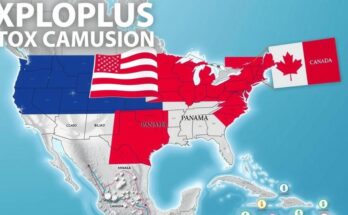The upcoming U.S. presidential elections on November 5 are pivotal, with candidates Kamala Harris and Donald Trump representing polarized visions that pose significant implications for the nation and global relations. Both candidates build upon extremist white-wing agendas and show reluctance to engage with international humanitarian standards or environmental concerns, risking further global discord and degradation.
The forthcoming U.S. presidential elections, taking place on November 5, are considered one of the most pivotal in recent memory. However, the clarity regarding the nature of the change that the elections may herald is questionable. Prominent candidates, including Vice President Kamala Harris and former President Donald Trump, represent factions of a polarized political landscape, each with their visions for America’s role in global affairs. Harris, representing the Democratic Party, advocates for humanitarian concerns but continues to support military aid to Israel, a nation facing accusations of war crimes against Palestinians. Trump’s Republican Party is viewed as closely aligned with apocalyptic Christian nationalism, endorsing unrestricted support for Israel and opposing regulations on arms sales. Both candidates exhibit a troubling ambivalence towards international humanitarian laws and human rights, dismissing global perspectives on the Israeli occupation. In addition to their foreign policy stances, both campaigns share an anti-immigration sentiment despite the U.S. being characterized by its immigration roots. The candidates’ positions embody a complex interplay of xenophobia and national self-identity, further accentuated by a general disregard for international treaties aimed at promoting accountability and environmental sustainability. Despite a growing international consensus on climate action, both candidates lean towards policies that favor fossil fuel exploitation, illustrating a disconnect from global environmental efforts. The implications of this election extend beyond the United States, with potential ramifications for global geopolitical dynamics, particularly within the Caucasian bloc and European regions. Should extreme white-wing politics take further root in the U.S., it may lead to increased environmental neglect, heightened tribal strife, and a regression in international cooperation.
The background of the U.S. presidential elections is deeply rooted in the nation’s historical context, wherein dominant political factions are engaged in a continual struggle over foreign policy, immigration, and compliance with international legal norms. The long-standing U.S. support for Israel amid ongoing conflicts in Palestine and Gaza has bred significant controversy and global concern, culminating in accusations of complicity in human rights violations. Furthermore, the persistent immigration debate reflects broader societal tensions regarding national identity and inclusivity, while contemporary environmental concerns challenge the bipartisan inclination towards fossil fuel dependability. As the elections approach, the intertwining of these issues underscores the critical nature of the decision facing the electorate, with global audiences keenly aware of the potential consequences.
In summation, the imminent U.S. presidential elections present a critical juncture not only for the nation but for global political dynamics. The candidates’ shared adherence to extremist white-wing policies, disregard for international norms, and perpetuation of xenophobia point to a concerning trajectory that could have far-reaching implications. A continuation of such ideologies could exacerbate global discord, hinder environmental efforts, and entrench tribal conflicts as the world watches closely. Thus, the stakes of this electoral outcome are crucial for both the U.S. and the international community.
Original Source: www.aljazeera.com




